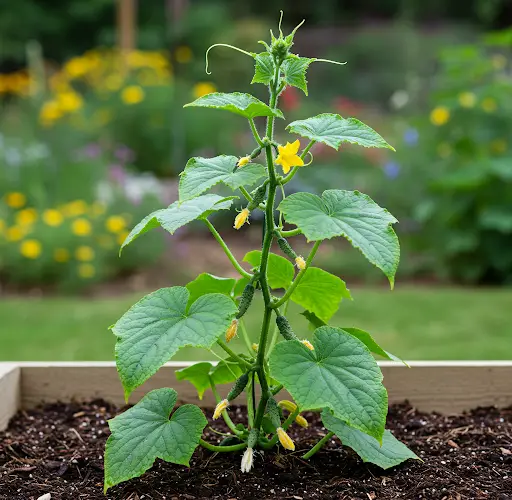The Secret Formula for Continuous Cucumber Bloom and Abundant Harvests
Cucumbers are one of the most beloved vegetables in any garden, known for their refreshing taste, versatility, and fast growth. Yet, getting them to continually bloom and produce fruit—especially as the season begins to wind down—can be a challenge. Whether you’re just starting out or are a seasoned gardener, you’ve likely noticed that cucumber plants are sensitive to shifts in nutrition and environment. The good news is there’s a surprisingly simple method that can significantly boost your cucumber yield using ingredients you probably already have at home.
This technique is not based on traditional fertilizers. Instead, it combines natural elements that work synergistically to nourish the plant, stimulate flower production, and enhance fruit development. The best part? It takes just a few minutes to prepare and apply, and the results can be impressive.
Why Cucumbers Need Special Attention
Cucumbers have relatively high nutritional needs, particularly when it comes to flowering and fruiting. As the plants grow, they use up nutrients quickly, and without replenishment, production can slow or even stop. They also need consistent moisture and benefit from improved leaf coverage to resist pests and diseases. That’s where this homemade plant tonic comes in. It helps provide gentle nourishment through both the soil and the leaves, encouraging your plants to keep producing even late into the growing season.
Ingredients for the Natural Cucumber Tonic
To make this plant-boosting spray and soil conditioner, you’ll need the following:
-
2 cups of milk (low-fat or full-fat, both work)
-
1 tablespoon of sugar
-
1 cup of water
-
2 drops of biodegradable liquid soap
-
1 handful of used ground coffee (for mulch)
Each ingredient plays an important role in supporting plant health:
-
Milk provides calcium, which is essential for strong cell walls and disease resistance. It also contains beneficial proteins and vitamins that feed the soil and promote plant vigor.
-
Sugar acts as an energy source, stimulating microbial life in the soil and encouraging flowering.
-
Water dilutes the mixture to a safe concentration, allowing even distribution over the leaves.
-
Liquid soap helps the mixture adhere to the leaves, enhancing absorption and protecting from pests.
-
Ground coffee offers nitrogen, improves soil structure, and retains moisture when used as mulch.
How to Prepare the Mixture
-
In a large mixing bowl, combine the milk, sugar, and water.
-
Stir thoroughly until the sugar is fully dissolved.
-
Add two drops of liquid soap and stir gently to blend. Avoid creating foam.
-
Let the solution rest for about 15 minutes, allowing the components to settle and integrate.
Application Instructions
Once the mixture is ready, pour it into a clean spray bottle. Apply the spray directly onto cucumber leaves, focusing especially on the undersides where pests may hide. This should be done every two weeks, and ideally after rainfall or watering, when plants are most receptive to extra nutrition.
Spraying in the early morning or late afternoon is recommended to avoid leaf burn during peak sunlight hours. The solution will help strengthen the foliage, encourage flowering, and support ongoing fruit development.
Enhancing the Soil with Coffee Mulch
After applying the spray, spread a thin layer of used ground coffee around the base of your cucumber plants. This acts as a mulch that helps retain soil moisture, improves drainage, and introduces organic matter. Coffee grounds are mildly acidic and provide a small boost of nitrogen—ideal for leafy growth early in the season and for maintaining plant health as cucumbers begin to set fruit.
Make sure not to use too much coffee, as a thick layer may create mold or hinder air circulation. A light scattering is sufficient.
Results to Expect
With consistent use, gardeners can expect to see the following improvements:
-
Increased flowering and extended fruiting period
-
Stronger, more resilient leaves and stems
-
Reduced incidence of powdery mildew and other foliar diseases
-
Better fruit quality in terms of size, taste, and sweetness
This method is particularly helpful as cucumbers enter the mid-to-late season, when many plants begin to lose momentum. By providing a gentle, consistent nutritional boost and improving soil conditions, this approach helps maintain high productivity for longer.
Final Thoughts
There’s no need to rely on synthetic fertilizers or expensive products to enjoy a healthy, productive cucumber garden. By using this natural tonic made from milk, sugar, and a few other simple ingredients, you can keep your plants blooming and bearing fruit well into the later weeks of the season.
Whether you’re growing cucumbers in garden beds, raised planters, or containers, this approach can help you maximize your harvest and enjoy fresh, crisp cucumbers straight from the vine.



